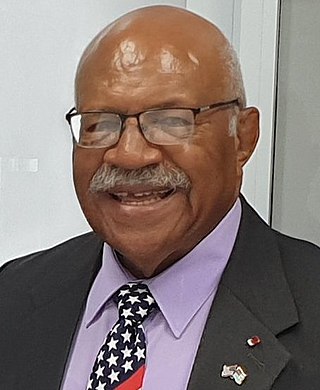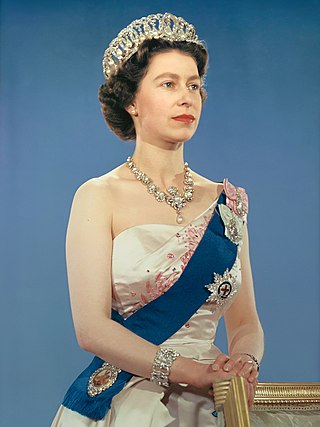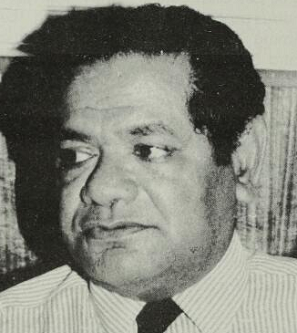 |
|---|
The members of the Parliament of Fiji from 1982 to 1987 consisted of members of the House of Representatives elected between 10 and 17 July 1982, and members of the nominated Senate.
 |
|---|
The members of the Parliament of Fiji from 1982 to 1987 consisted of members of the House of Representatives elected between 10 and 17 July 1982, and members of the nominated Senate.
| Class | Member | Notes | |
|---|---|---|---|
| President | Wesley Barrett | ||
| Council of Rotuma's Nominee | Kamoe Petero | ||
| Great Council of Chiefs' Nominees | Jone Mataitini | ||
| Aporosa Rakoto | |||
| Joeli Sereki | Replaced by Jona Qio | ||
| Inoke Tabua | |||
| Manasa Tabuadua | |||
| Tevita Vakalalabure | Replaced by Seci Nawalowalo | ||
| Livai Volavola | |||
| Epineri Vula | |||
| Leader of the Opposition's Nominees | Muntaz Farzand Ali | ||
| Napolioni Dawai | |||
| Osea Gavidi | |||
| Harnam Singh Golian | |||
| Kaur Baltan Singh | Replaced by Krishna Narsingha Rao | ||
| Colin Weaver | Replaced by Balwant Singh Rakka | ||
| Prime Minister's Nominees | Jone Banuve | ||
| Ifereimi Buaserau | Replaced by Leo Smith | ||
| Bill Clark | |||
| Sher Mohammed Khan Sherani | Replaced by Asad Ali Asgar | ||
| R. D. Patel | |||
| Manikam Pillai | Replaced by Qoriniasi Bale in 1984 | ||
| Source: Fiji Today, [1] Fiji Handbook [2] | |||

Fiji has experienced many coups recently, in 1987, 2000, and 2006. Fiji has been suspended various times from the Commonwealth of Nations, a grouping of mostly former British colonies. It was readmitted to the Commonwealth in December 2001, following the parliamentary election held to restore democracy in September that year, and has been suspended again because of the 2006 coup, but has been readmitted a second time after the 2014 election. Other Pacific Island governments have generally been sympathetic to Fiji's internal political problems and have declined to take public positions.

Fiji, officially the Republic of Fiji, is an island country in Melanesia, part of Oceania in the South Pacific Ocean. It lies about 1,100 nautical miles north-northeast of New Zealand. Fiji consists of an archipelago of more than 330 islands—of which about 110 are permanently inhabited—and more than 500 islets, amounting to a total land area of about 18,300 square kilometres (7,100 sq mi). The most outlying island group is Ono-i-Lau. About 87% of the total population of 924,610 live on the two major islands, Viti Levu and Vanua Levu. About three-quarters of Fijians live on Viti Levu's coasts: either in the capital city of Suva; or in smaller urban centres such as Nadi—where tourism is the major local industry; or in Lautoka, where the sugar-cane industry is dominant. The interior of Viti Levu is sparsely inhabited because of its terrain.

The Alliance Party, was the ruling political party in Fiji from 1966 to 1987. Founded in the early 1960s, its leader was Kamisese Mara, the founding father of the modern Fijian nation. Widely seen as the political vehicle of the traditional Fijian chiefs, the Alliance Party also commanded considerable support among the Europeans and other ethnic minorities, who, although comprising only 3–4% of Fiji's population, were over represented in the parliament. Indo-Fijians were less supportive, but the Fijian-European block vote kept the Alliance Party in power for more than twenty years.

Ratu Sir Penaia Kanatabatu Ganilau was a Fijian politician who served as the first President of Fiji, serving from 8 December 1987 until his death in 1993. He had previously served as Governor-General of Fiji, representing Elizabeth II, Queen of Fiji, from 12 February 1983 to 15 October 1987.

Sitiveni Ligamamada Rabuka is a Fijian politician who has served as Prime Minister of Fiji since 24 December 2022. He was the instigator of two military coups in 1987. He was democratically elected as Prime Minister of Fiji, serving from 1992 to 1999, and again in 2022, leading a three-party coalition. He also served as Chairman of the Great Council of Chiefs from 1999 to 2001, and later as Chairman of the Cakaudrove Provincial Council from 2001 to 2008.

The Fijian coups d'état of 1987 resulted in the overthrow of the elected government of Fijian Prime Minister Timoci Bavadra, the deposition of Elizabeth II as Queen of Fiji, and in the declaration of a republic. The first coup d'état, in which Bavadra was deposed, took place on 14 May 1987; a second coup d'état on 25 September ended the monarchy, and was shortly followed by the proclamation of a republic on 10 October. Both military actions were led by Lieutenant Colonel Sitiveni Rabuka, then third in command of the Royal Fiji Military Forces.

General elections were held in Fiji between 10 and 17 July 1982. The paradoxical results were both a triumph and a setback for the Alliance Party of the Prime Minister, Kamisese Mara. The Alliance received 52% of the popular vote, only slightly down on its previous total, but won only 28 seats, eight fewer than in the previous elections of September 1977. Part of the reason for this discrepancy was that the slight surge in support for Mara's Alliance in the Indo-Fijian community, from 14 percent to 16 percent, was not sufficient to translate into seats in Fiji's communal electoral system, and did not therefore off-set losses among the ethnic Fijian community, particularly in the west of the country. The Western United Front of Osea Gavidi won only two seats, but split the vote, allowing the National Federation Party (NFP), with which it tactically allied itself, to gain seven seats for a total of 22. The NFP, which had split into two factions before the previous elections, had been reunited.

General elections were held in Fiji between 4 and 11 April 1987. They marked the first electoral transition of power in Fijian history. Despite receiving just under 50% of the vote, the Alliance Party of longtime Prime Minister, Kamisese Mara was defeated by a coalition of the Fiji Labour Party and National Federation Party, which won 28 seats to the Alliance's 24. The Labour Party's Timoci Bavadra became Prime Minister.

General elections were held in Fiji between 23 and 30 May 1992. It was the first election held since two military coups in 1987 had severed Fiji's 113-year-old constitutional links with the British Monarchy, and later Fijian Monarchy, and ushered in a republic.

The Attorney-General is a political and legal officer in Fiji. The attorney-general is the chief law officer of the State, and has responsibility for supervising Fijian law and advising the government on legal matters. Like other members of the Fijian Cabinet, the attorney-general is appointed by the president on the advice of the prime minister.

The Fijian Nationalist Party (FNP) was a nationalist political party in Fiji.

The Dominion of Fiji was the official name of Fiji between October 1970 and 6 October 1987. When British rule ended in 1970, the Colony of Fiji was given independence as a Dominion, in which the British monarch, Elizabeth II, remained head of state as Queen of Fiji, represented by the Governor-General. The Republic of Fiji, removing Queen Elizabeth II as head of state, was proclaimed on 6 October 1987 after two military coups.

The monarchy of Fiji arose in the 19th century, when native ruler Seru Epenisa Cakobau consolidated control of the Fijian Islands in 1871 and declared himself king, or paramount chief, of Fiji. Three years later, he voluntarily ceded sovereignty of the islands to Britain, making Fiji a crown colony within the British Empire.
Rusiate Namoro is a Fijian former rugby union footballer, he played as a hooker or prop. Along with Koli Rakoroi, Elia Rokowailoa, Tom Mitchell, Epeli Naituivau and Setareki Tawake, he was one of the eight members of the country's armed forces to play for Fiji in a Rugby World Cup squad.

Mosese Qionibaravi was a Fijian chief, civil servant and politician. He served as a member of the House of Representatives from 1973 until his death, also holding the offices of Speaker of the House, Minister of Foreign Affairs, Tourism and Finance, and Deputy Prime Minister.